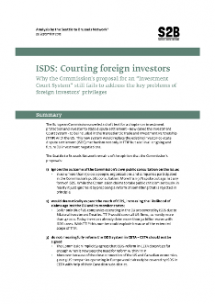ISDS: Courting foreign investors Why the Commission’s proposal for an “Investment Court System” still fails to address the key problems of foreign investors’ privileges
The European Commission unveiled a draft text for a chapter on investment protection and investor to state dispute settlement – now called the Investment Court System - to be included in the Transatlantic Trade and Investment Partnership (TTIP) with the US. This new system would replace the existing investor-to-state dispute settlement (ISDS) mechanism not only in TTIP but also in all ongoing and future EU investment negotiations.

Authors
Summary
The Seattle to Brussels Network remains of the opinion that the Commission’s proposals:
1) ignore the outcome of the Commission’s own public consultation on the issue;
- In 2014 more than 150 000 people, organizations and companies participated in the Commission’s public consultation. More than 97% spoke out against any form of ISDS. While the Commission claims to take public criticism seriously, in reality it just ignores it by proposing a reform of something that is rejected in principle.
2) would dramatically expand the reach of ISDS, increasing the likelihood of claims against the EU and its member states;
- So far only 8% of US companies operating in the EU are covered by ISDS due to Bilateral Investment Treaties. TTIP would cover all US-firms, currently more than 47,000. Today investors already claim more than 30 billion euros with ISDS cases. With TTIP this number could explode because of the extended scope of TTIP.
3) do not meaningfully reform the ISDS system in CETA – CETA should not be signed
- The Commission implicitly agrees that ISDS-reform in CETA doesn’t go far enough when it now sees the need for reform within TTIP.
- Moreover because of the close connection of the US and Canadian economies, 4 out 5 US companies operating in Europe would already be covered by ISDS in CETA with help of their Canadian subsidiaries. 2
4) ignore the elephant in the room: that there is no need for ISDS; and
5) do very little to address the fundamental problems of the ISDS system.
- ISDS will still grant foreign investors the sole right to sue states based on investment protection enshrined in treaties and not democratically decided laws like everybody else.
- It will still be one sided process which allows investors to sue states for policy choices while there is no matching mechanism to sue them for violating public policy objectives, health, labour and environmental standards.
- The definition of what constitutes investment is as broad as ever
- The “right to regulate” has not been preserved. The only effective way to protect the right of governments to regulate in an investment agreement are by not undermining it via protection standards or by clearly excluding it from protection standards.
- The dangerous “Fair and Equitable Treatment” standard remains
- Investors can still sue claiming indirect expropriation
- The Commission’s reform proposal does not rule out the possibility of picking the most suitable forum for the investor to pursue its claims. While there are some restrictions on running cases simultaneously on the national level and via ISDS, there is no provision against cumulating the two.
- Despite re-labelling arbitrators as judges they will still be highly paid lawyers with an interest in more and longer running cases. The parties in the dispute will pay them per case. Therefore, they maintain a strong financial incentive to interpret the law in favour of the investor. The existing of a pool of “judges” for a given time period doesn’t change the fact either. Finally the provisions against conflict of interest are vague and it is not clear who defines them.
- The introduction of an appeal body might improve the functioning of ISDS but it does neither address the fundamental problems with ISDS nor is it clear who would sit on this appeal body and on which basis it would decide.
- With the Commission’s reform proposal ISDS will still be a powerful tool for investors to threat governments when it comes to policies that might endanger profits but benefit public interests or the environment. There is still no convincing argument why we need ISDS in the first place.



